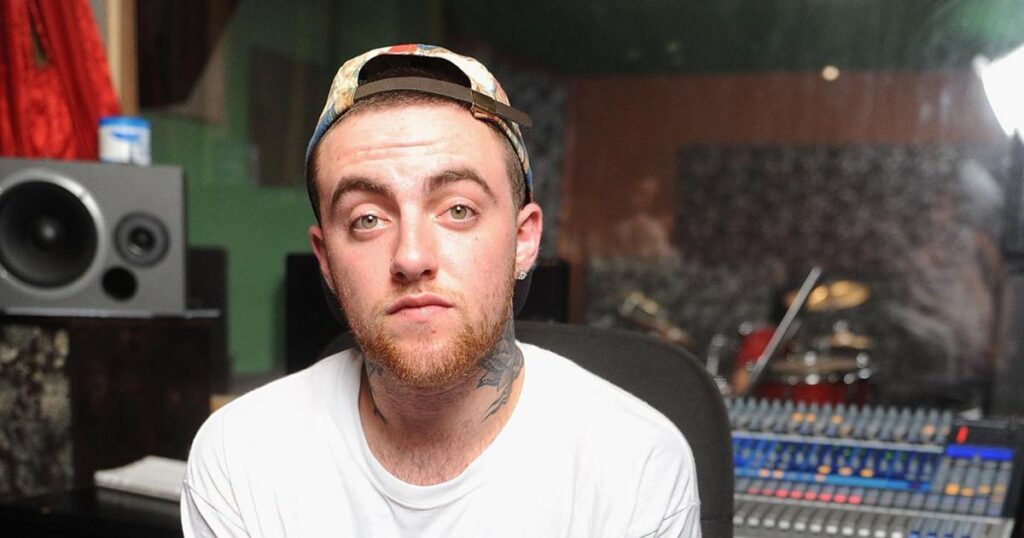Launched in 2013, the harris project is a nonprofit dedicated to the prevention and treatment of co-occurring disorders (COD) — the combination of mental health challenges and substance use issues. Us Weekly has partnered with the harris project to bring you The Missing Issue, a special edition focusing on the stories of celebrities who struggled with COD.
In opening up about his battle with drugs and alcohol, rapper Mac Miller also spoke honestly about his mental health issues, including lengthy bouts of depression. The “Good News” rapper, who died of an accidental overdose involving fentanyl and cocaine on Sept. 7, 2018, at age 26, detailed the highs and lows of his co-occurring disorders in multiple interviews.
Coping With Criticism: ‘I Was Lost’
In a January 2013 interview with Complex, Mac Miller shared that, despite the success of Blue Slide Park — the first independently distributed hip-hop album since 1995 to debut at No. 1 on the Billboard 200 — the criticism ultimately led him to a dependency on the antihistamine/sedative promethazine, commonly known as “lean.”
“A lot of the reviews were more on me as a person,” he told the outlet, per Billboard. “To be honest, that was even worse. You’re 19, you’re so excited to put out your first album, you put it out — and no one has any respect for you or for what you did.”
“I was not happy and I was on lean very heavy,” he continued. “I was so f–ked up all the time, it was bad. My friends couldn’t even look at me the same. I was lost.”
Struggles With Success
In a September 2015 interview with Larry King, Miller discussed the direct link between his depression and substance use. “I definitely was going through a drug problem, and I think it was more my state of mind. I was just pretty depressed,” he said.
“I think it started [with success],” he said. “It’s funny, because you talk to people, and they say, ‘What do you have to be depressed about? You have money’ … Fame is tricky because you read what’s said about you, and you know what you know to be true, and the lines start to blur.”
Working on His Mental Health
Miller’s GO:OD AM album, released in 2015, represented a brighter outlook than his 2014 mixtape Faces, and the rapper revealed that the tonal shift was the result of getting healthier.
“Faces was, in short, super depressing, and I’m not as depressed anymore,” he told Billboard in August 2015. “Making music when you’re depressed is great therapy, but I wanted this album to be in a different headspace.”
Of his healthier mindset, Miller said: “I go outside and live a little bit more. I touch people more. Before, I was super-insular all the time, just staying in a room by myself, and it’s so easy to paint this horrible picture of life when you’re not giving yourself a chance to live it.”
Wanting to Feel Peace
In a Vulture interview published a day before his death, Miller discussed his goal of striking a balance between the highs and lows. “I really wouldn’t want just happiness,” he said in September 2018. “And I don’t want just sadness either. I don’t want to be depressed. I want to be able to have good days and bad days … I can’t imagine not waking up sometimes and being like, ‘I don’t feel like doing s—.’ And then having days where you wake up and you feel on top of the world.”
Writing His Pain
In his 2018 song “Come Back to Earth,” Miller shared some of the turmoil he was feeling and his search for escape from mental anguish in his lyrics: “My regrets look just like texts I shouldn’t send /I just need a way out /Of my head, I’ll do anything for a way out / Of my head /Don’t you know that sunshine don’t feel right /When you inside all day? /I wish it was nice out, but it look like rain.”
To purchase The Missing Issue for $8.99 go to https://magazineshop.us/harrisproject.
If you or someone you know is struggling with mental health and/or substance use, you are not alone. Seek immediate intervention — call 911 for medical attention; 988 for the Suicide and Crisis Lifeline; or 1-800-662-HELP for the SAMHSA (Substance Abuse and Mental Health Services Administration) National Helpline. Carrying naloxone (Narcan) can help reverse an opioid overdose.
Read the full article here

